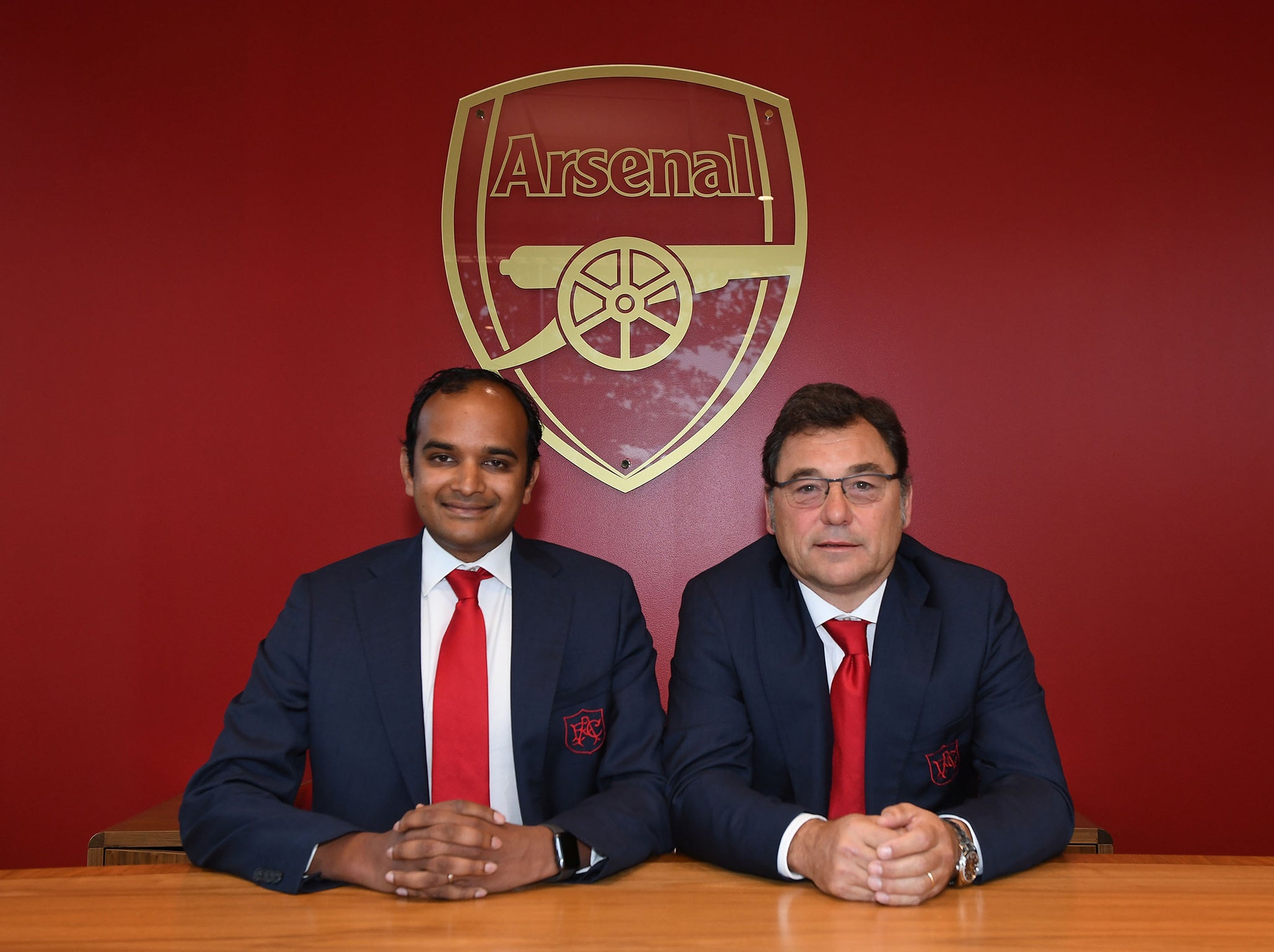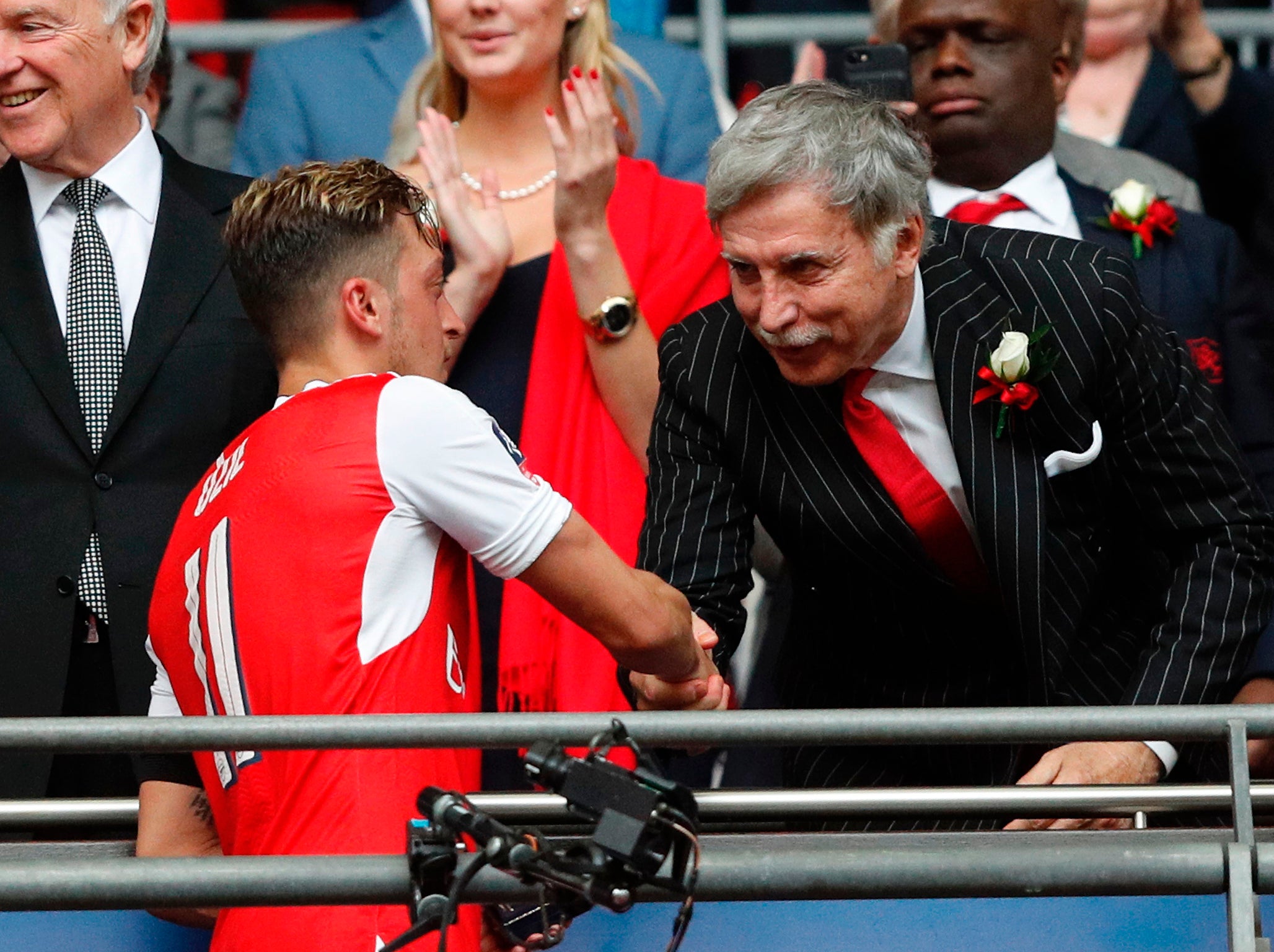Arsenal’s Raul Sanllehi and Vinai Venkatesham on contracts, Stan Kroenke and returning to the top four
As Unai Emery continues to remould Arsenal on the pitch, with the club on a long undefeated run stretching back over three months, Sanllehí and Venkatesham have been busy restructuring away from it

Your support helps us to tell the story
From reproductive rights to climate change to Big Tech, The Independent is on the ground when the story is developing. Whether it's investigating the financials of Elon Musk's pro-Trump PAC or producing our latest documentary, 'The A Word', which shines a light on the American women fighting for reproductive rights, we know how important it is to parse out the facts from the messaging.
At such a critical moment in US history, we need reporters on the ground. Your donation allows us to keep sending journalists to speak to both sides of the story.
The Independent is trusted by Americans across the entire political spectrum. And unlike many other quality news outlets, we choose not to lock Americans out of our reporting and analysis with paywalls. We believe quality journalism should be available to everyone, paid for by those who can afford it.
Your support makes all the difference.“Internally we are calling this period ‘The New Chapter’ which I think says a lot,” Raúl Sanllehí smiles as he settles into his seat at the beginning of a long chat on the future of Arsenal, one held over coffee and pastries. Sanllehí, the club’s head of football, is joined by managing director Vinai Venkatesham, and over the following hour variations of the phrase crop up time and again. A new chapter. A new project. A new direction. Arsenal are a club enveloped in change.
As Unai Emery continues to remould Arsenal on the pitch, with the club on a long undefeated run stretching back over three months, Sanllehí and Venkatesham have been busy restructuring away from it. The departure of chief executive Ivan Gazidis — “a surprise,” Venkatesham admits — consummated the duo's ascent to the top of the tree. Arsenal had suddenly become, in the words of Sanllehí, “one organisation — but with two leaders.”
The unlikely duo have certainly been busy. Sanllehí, who brings a wealth of experience from his decade of considerable influence at Barcelona, takes care of footballing matters. Meeting other clubs, negotiating transfers, brokering contracts. Venkatesham, a loquacious Oxford graduate who has previously worked for Deloitte and the British Olympic Association, is the business brain. Both are convinced that the club’s much-maligned ‘self-sustaining business model’ can prove a success.
“It is not going to be easy, but I absolutely, 100 per cent believe that Arsenal can get back to where it needs to be,” Venkatesham insists. “The first step we need to do is get back into the Champions League and then we need to start competing and then we need to start winning the biggest trophies in the game. I believe we can do that. Equally, I also am not naïve enough to know that is going to be challenging and that this isn't a difficult and competitive environment.”
But before the club can aspire to win these tournaments, they must first quality for them. Arsenal have never been in a position to compete with the unfettered sovereign wealth of Europe’s biggest spenders, a situation hardly helped by two consecutive finishes outside of the top four. As a result, the club’s football revenues have steadily decreased over the past two years. So for how much longer can they expect to compete while locked outside the Champions League?
“The gap between the Champions League and Europa League does flex depending on how well you do in the competition,” Venkatesham argues. “But, yes, we do have a self-sustaining business model and so the more years you spend outside of the Champions League the bigger the strain it puts on the business model. Yet we run the business in a responsible way and we have a robustness built into the model, so that we can have some seasons in the Europa League and still make the investments we need.”
For the time being, however, those investments are unlikely to include many big-money signings, particularly considering the club’s stretched and rather sloping wage-bill. Instead, the club wants to spend money more efficiently — “it is early days, but players like Lucas Torreira and Matteo Guendouzi already look to be a big part of our future,” says Venkatesham — with Sanllehí particularly determined to end the costly practice of running down players’ contracts.
Aaron Ramsey, Danny Welbeck and Petr Cech are all free to leave the club in the summer, 18 months after Alexis Sanchez decided to up sticks for Manchester United. Sanllehí has pledged to “improve clarity”.
“It is no secret that the sooner you leave out the uncertainty of the length of the contract, the better,” he admits. “You should try to always avoid going into the last year of a contract for many different reasons — from the club’s side and also for the player. We will try to get clarity earlier. As a normal rule all clubs would rather not go into the last year of a contract, because then you have clarity over whether you want to sell, renew or send out on loan. All the options over that period.”
Ramsey’s protracted contract situation has been a frustrating and unnecessary wrinkle in an otherwise encouraging start to the new season. Results have been positive, with Arsenal two points and one place in the Premier League table better off than last season. They are through to the last eight of the Carabao Cup and last 32 of the Europa League. And Emery’s arrival has proven overwhelmingly popular with supporters, with a clear transformation already well underway.

Sanllehí and Venkatesham both played important roles in the process to appoint Emery and the pair remain convinced that they selected the right successor to Arsène Wenger’s 21-year reign.
“His energy is just absolutely extraordinary,” says Venkatesham. “I remember that he said in his first press conference that the one thing he would promise to the fans is that he would work hard. Obviously, everybody just thought it was a throwaway comment but he is always on it — his work ethic is extraordinary. When you are on that long flight home from eastern Europe after a Europa League game and everybody is trying to sleep, he is re-watching the game, analysing it. All times, all hours. His energy and passion is infectious.”
Emery’s is not the only appointment the pair are proud of. Former captain Per Mertesacker was named academy manager in the summer and has been a hit. “I have got to say, I am blown away by Per,” Venkatesham nods. “It is almost impossible to believe that it is only a few months since he was playing football and he has been extraordinary already. And we need to make sure our academy pathway continues to drive great talent into the first-team.”
But for all of the careful optimism now rolling around The Emirates, Stan Kroenke's overall ownership of the club remains unpopular, especially after the American bought out Alisher Usmanov, with stock market rules then allowing him to make compulsory purchases of all remaining shares. Those fans who lost their shares felt robbed. “I feel disenfranchised, as if I am no longer part of this club,” one fan, Malcolm Davis, told the Arsenal Supporters' Trust. “AFC is no longer my club, but Kroenke’s,” said another.

Arsenal’s new leadership duo share a strong working relationship with Kroenke — Venkatesham stresses that he has “spoken with Josh three or four times already this week” — and both insist that the family’s outright ownership of the club is a positive development. “One thing that is crucial for the good management of a club is stability, and I believe we are in a new stage because we have this full sense of stability now,” says Sanllehí.
“We are talking about a new chapter — and this is part of the new chapter also. There are many dimensions to it and this is another one. I feel very strongly that every time we have interacted with the owners, you get a sense of support and alignment.” Venkatesham agrees. “I don’t know if it is possible to increase their engagement and connection with the club anymore, but they are probably even more connected now than they have ever been.”
While Kroenke Sports & Entertainment’s management of the club is not universally popular, this direct line of communication with Sanllehí and Venkatesham is clearly important. Having moved away from a decidedly autocratic management structure, it is crucial that the many new faces in Arsenal’s revamped executive set-up are pulling in the same direction.
“Ultimately at Arsenal, what we are trying to do is make all of our fans right around the world proud of our club,” Venkatesham adds. “And we will do that most effectively by winning, but winning in our way. That means winning matches and trophies. The key message from us is that we are a team working hand in glove to move this great club forward. And the fact me and Raúl know each other so well will help that.”
Join our commenting forum
Join thought-provoking conversations, follow other Independent readers and see their replies
Comments